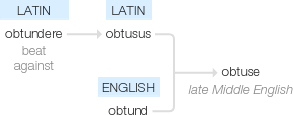Obtuse
late Middle English (in obtuse (sense 3)): from Latin obtusus, past participle of obtundere ‘beat against’ (see obtund).
wiktionary
From Middle French obtus(“obtuse (geometry); narrow-minded, obtuse; boring, dull, lifeless”), from Latin obtūsus(“blunt, dull; obtuse”), past participle of obtundere, from obtundō(“to batter, beat, strike; to blunt, dull”), from ob-(“prefix meaning against”) (see ob-) + tundō(“to beat, strike; to bruise, crush, pound”) (ultimately from Proto-Indo-European *(s)tewd-, from *(s)tew-(“to hit; to push”)). More at obtund.
etymonline
obtuse (adj.)
early 15c., "dull, blunted, not sharp," from Latin obtusus "blunted, dull," also used figuratively, past participle of obtundere "to beat against, make dull," from ob "in front of; against" (see ob-) + tundere "to beat," from PIE *(s)tud-e- "to beat, strike, push, thrust," from root *(s)teu- "to push, stick, knock, beat" (source also of Latin tudes "hammer," Sanskrit tudati "he thrusts"). Sense of "stupid, not acutely sensitive or perceptive" is by c. 1500. In geometry, in reference to a plane angle greater than a right angle," 1560s. Related: Obtusely; obtuseness.
